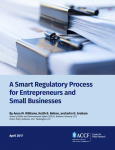Timothy M. Doyle
EPA Leads the Way on Permitting Reform
The mere act of reevaluating a permitting process intended to protect the environment is not, in itself, pretext for allowing manufactures to pollute more. Environmental regulations, like all regulations, need to be evaluated with respect to their mandated purpose.
One forgotten agency can curb alarming growth of regulation
The alarming growth of federal guidelines, directives and rules are outpacing the ability to effectively oversee their impact. Congress should empower OIRA to meet the challenge.
New York’s Pensions Should Focus On Financial Returns — Not Politics
Published in Investors' Business Daily
The recent push by New York City Mayor Bill de Blasio and Comptroller Scott Stringer to divest the city's pensions from fossil fuels is playing politics with retiree savings at a time when they can least afford it.
The recent push by New York City Mayor Bill de Blasio and Comptroller Scott Stringer to divest the city's pensions from fossil fuels is playing politics with retiree savings at a time when they can least afford it.
We can’t ‘reclaim our building heritage’ without cutting red tape
Published in The Hill
Overly burdensome red tape should never be a major factor in determining a project’s successful beginning.
Overly burdensome red tape should never be a major factor in determining a project’s successful beginning.
Politics Over Performance: New York City Pension Funds
Bad Apple: New ACCF Report finds New York City’s public pension fund system in bad shape and getting worse
Regulatory Improvements to Ensure Process Certainty: Ten Impactful Ideas
This paper is a result of a November 16, 2016 bipartisan roundtable discussion identifying ten specific issues and beginning the dialogue on finding solutions.
CalPERS and the Point of No Returns
New Report Analyzes How Politically Motivated Investments are Sinking the Nation’s Largest Public Pension Fund, Leaving U.S. Taxpayers Accountable for Losses
Congress must come to terms on climate change regulation
What has become abundantly clear is that there is widespread disagreement in Congress, the Supreme Court and now two successive administrations in how to address climate change. Given its global impact, these types of monumental decisions need to be made in the halls of Congress as the elected body to identify, discuss and act as representatives of the people.
Ignoring free market principles will cost US solar jobs
Published in The Hill
As advocates of market-based polices, we believe that the solar industry works best when market forces are left to decide which companies flourish and which do not.
As advocates of market-based polices, we believe that the solar industry works best when market forces are left to decide which companies flourish and which do not.
A Smart Regulatory Process for Entrepreneurs and Small Businesses
The unrestrained growth of the federal regulatory state impedes U.S. economic growth and disproportionately affects America’s small businesses and entrepreneurs, according to a new report released today by the American Council for Capital Formation Center for Policy Research.
The report – A Smart Regulatory Process for Entrepreneurs and Small Businesses – details how the burden of federal regulation falls unevenly on the small businesses that are major drivers of innovation, productivity, growth, and job creation in the U.S. economy.
A Powerful Check on the Regulatory State
Published in Real Clear Policy
While smart regulations and rules are often necessary to carry out legislation, the role of the federal agencies is not to create new policy but, rather, to implement the policies of the legislature using the power delegated to them by Congress. The CRA was created to ensure that federal bureaucrats don’t forget that we live in country in which laws are created by representatives of the people and enacted through a system with checks and balances.
While smart regulations and rules are often necessary to carry out legislation, the role of the federal agencies is not to create new policy but, rather, to implement the policies of the legislature using the power delegated to them by Congress. The CRA was created to ensure that federal bureaucrats don’t forget that we live in country in which laws are created by representatives of the people and enacted through a system with checks and balances.
Trump Administration Offers an Opportunity to Correct Course on Energy Policy
Published in Real Clear Energy
Instead of declaring war on traditional energy resources, the new administration should pursue policies to ensure Americans have access to energy that is abundant, affordable, and with the least environmental impact. Support for advanced research and development can make sure those resources are used in increasingly cleaner and more efficient ways.
Instead of declaring war on traditional energy resources, the new administration should pursue policies to ensure Americans have access to energy that is abundant, affordable, and with the least environmental impact. Support for advanced research and development can make sure those resources are used in increasingly cleaner and more efficient ways.
President Obama’s Energy Legacy: Will It Last?
The new administration should focus on encouraging innovation and technological advancements so that we may continue to benefit as a nation from our vast wealth of traditional energy resources, while continuing to steadily reduce the impact on the environment from their production and use.
The Presidential Politics of Energy Policy
Published in Real Clear Energy
Climate change is the new energy policy. President Obama has shifted the nation in recent years away from the abundance of oil and natural gas to cleaner, though more expensive, renewable energy sources.
Climate change is the new energy policy. President Obama has shifted the nation in recent years away from the abundance of oil and natural gas to cleaner, though more expensive, renewable energy sources.
The Case for Cutting Red Tape
Published in Morning Consult
The growing accumulation of federal rules that increasingly govern every facet of American life is a disturbing trend that holds consequences both for individual liberties and the health of the U.S. economy.
The growing accumulation of federal rules that increasingly govern every facet of American life is a disturbing trend that holds consequences both for individual liberties and the health of the U.S. economy.
Federal Regulation: Preventing the U.S. From Regaining Energy Independence
A Critique of BLM’s 2012 Proposed Rule on Hydraulic Fracturing

















